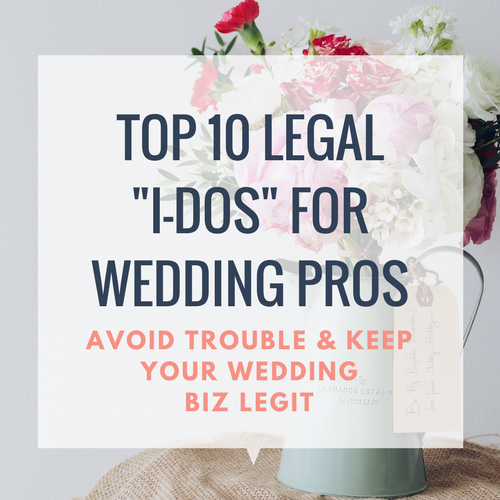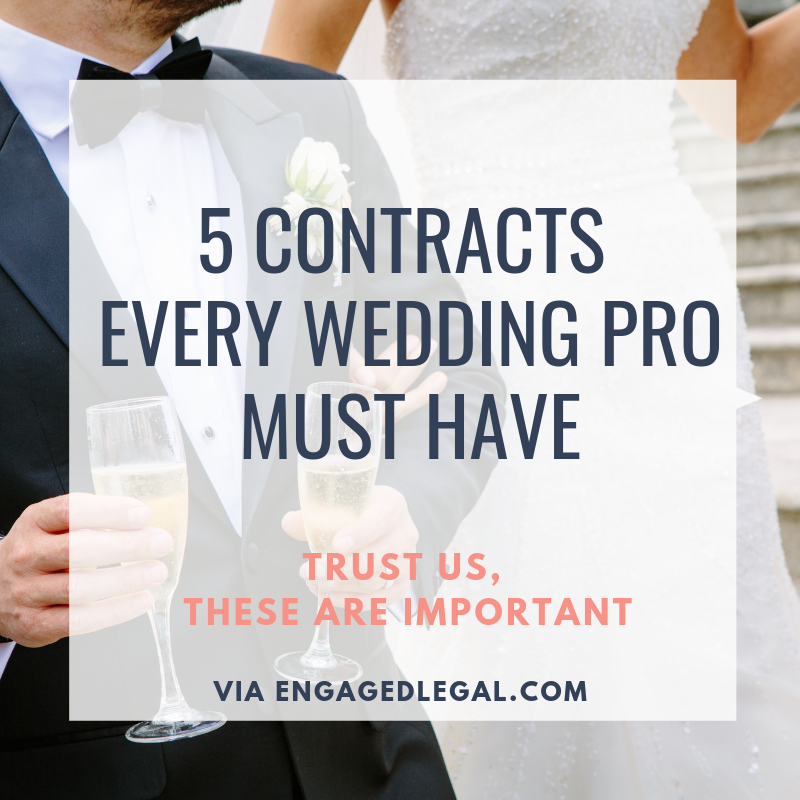7 Contract Negotiation Tips for Wedding and Event Pros (from someone who went to law school!)
/Set the Scene: You’ve got a potential client that you LOVE and they are getting married at a DREAM wedding that’s going to pump up your portfolio in a BIG way.
It’s your DREAM TEAM of vendors. And everything is going awesome. You send out your contract and you’re SO excited to get started serving this couple.
…But then you get an email from Uncle Ned. Uncle Ned is a lawyer, and it’s his time to shine.
He’s taking this VERY seriously. And he’s ready to negotiate terms with you.
What’s a wedding pro to do?
Don’t panic, first of all. Negotiating contracts with clients is a crucial aspect of any business relationship, but can feel a LITTLE bit tricky when you’re in the wedding industry because of the emotions involved..
But at the end of the day, you’re a business owner. And it’s not personal— it’s business. So I’m here to make sure you know the tricks to keeping those negotiations from getting you too flustered and potentially causing you to lose money, rights, or a client.
Let’s do it.
1. Set the Tone: Negotiation begins at your first interaction.
Building a strong rapport with potential clients sets the foundation for successful negotiations. In your first few meetings, take the time to understand their needs, preferences, and expectations so you can ensure they are addressed in the contract— maybe that will help avoid contract negotiations altogether!
Employing active listening creates a sense of trust and understanding, which allows you to tailor your offerings and approach to meet their specific requirements. By demonstrating your expertise and a genuine interest in their vision, you establish yourself as a valuable expert that they’ve GOT to have on their team. Which brings us to….
2. Become “THEIR PERSON”
In a crowded industry, you need to make potential clients want YOU and YOU ALONE. Because you’re awesome, duh.
During your initial communications, emphasize the unique value and expertise you bring to the table. Showcase your track record of successful events and satisfied clients. Highlight the quality of your services, creativity, attention to detail, and ability to deliver exceptional experiences. Drop a few tidbits of knowledge like breadcrumbs.
By articulating your special sauce effectively, you position yourself as THE expert in your field and instill confidence in the client's decision to choose your services— even if they don’t love your pricing or other contract requirements.
3. KNOW YOUR CONTRACT
This should go without saying, but know what’s in your contract and know what it means. Don’t just copy and paste together a Frankenstein contract and expect things to make sense— to your client OR to you!
By knowing what’s in your own contract, you — again— are the expert. You’ll be able to know which clauses can be modified and which are non-starters. That saves EVERYONE time!
But you can only do this if you spend time going through your contract and reviewing any terms that might seem unfamiliar to you. Do a quick Google search to identify difficult concepts like insurance additional insureds, copyright assignments vs. licenses, or indemnification. You can have the best contract template in the world, but if you don’t know what’s in it well, that’s going to cause some confusion!
Ensure you are specific about your services, and tell clients exactly what you’re providing them. Make sure you’ve been clear (in WRITING) about nonrefundable retainers, terminations, (cancellations) and what happens with money. Remember: They are reviewing a FEW contracts at once, so it’s easy for couples to get confused on who promised what!
4. Don’t Be So Rigid You Can’t Offer Custom Solutions
While it's important to know your worth, if you’re presented with an otherwise “dream job” except for one or two contract changes, you can be flexible and willing to customize your services.
Are they pushing back on pricing but seem like a dream client at your dream venue? Modify your services to meet their specific requirements without overtaxing you. Maybe you offer less time/ coverage for the event, fewer design options, or the same options but for a smaller guest list.
Do they want to cut the model release from your contract, but yo really want photos of this particular event? Explain the purpose of the release. Or, instead, offer a “preapproved images” release where they can pre-approve selected photos for your marketing or social media if they choose. If you explain why you want their photos, they might be more keen on permitting their use!
Are they demanding a copyright transfer in all of your work? That’s fine, but they’ll need to pay extra for it since that doesn’t “come standard” with your packages. 🤷🏻♀️
Providing options for flexibility demonstrates your commitment to serving them well while fostering a collaborative environment where both parties get what they need. A win-win!
But don’t be a doormat: establish those boundaries and communicate any limitations or terms that are non-negotiable to protect the integrity of your services.
5. …But 🎶Know When to Hold ‘Em/ Know When to Fold ‘Em/ Know when to walk away
And know when to run🎶
If they are starting to get pushy, refuse to compromise, or seem like they’re going to be “one of those clients…” Run. Do not walk.
Your gut will tell you the difference between a client who truly has limitations versus someone who is just trying to talk down pricing.
6. Watch Out for These Changes
Changing parts of a contract can always cause a ripple effect, but there are some areas that are more likely to cause unintended consequences than others. Anytime you see changes in the following areas. reallllllly scrutinize the change and look at any cross-references carefully:
Indemnification
Termination
Liability Limitations
Names of the Clients (couple vs. parents) and signers of the agreement
As Always, Call Your Lawyer if You Need Help
This one should be a given, but don’t hesitate to call your local neighborhood lawyer for help if things are getting tricky. That’s literally what lawyers are for! They will be able to explain the effect of changing certain provisions, and just what that means for you.
*****
Effective negotiation requires strong communication skills, an understanding of the client's needs and expectations, and the ability to find a balance between protecting the interests of both you and your client. Active listening, knowing your gives and “no gos,” and identifying exactly what you need out of the contract to protect you can create a contract that meets their needs as well as yours.



















